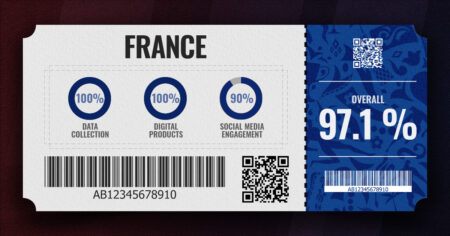When it comes to assessing the maturity of a rights holder’s digital transformation, no one organization is the same. It’s rare that an entity will show flying colors across all areas of their business acumen, let alone an aptitude for its fan engagement, digital innovation, and data governance all in one. That said, there are always exceptions.
Now that the dust has settled on the Qatar 2022 men’s FIFA World Cup, we are able to reflect on a ground-breaking tournament that featured many of the world’s most exciting football teams on the field of play, as well as several of the most sophisticated organizations when it comes to their respective digital transformation efforts, highlighted best in our inaugural World Cup Data Report 2022.
According to N3XT Sports proprietary research, the French Football Federation (FFF) represented the best-in-class at Qatar 2022 for digital maturity, scoring 100 percent for its data-collection capability and digital-product diversity and acting as the only member association (MA) to receive top marks across both categories.
Note, the English Football Association (The FA), the Argentine Football Association (AFA), the Danish Football Association (DBU), The German Football Association (DFB), the Portuguese Football Federation (FPF), and the Uruguayan Football Association (AUF) also scored full marks for their digital inventories, while others demonstrated high maturity levels.

Whereas the FFF was the single MA to show an impeccable data-collection capability, the only points the federation dropped were for its total cross-platform activity via its social media channels. Nevertheless, with more than 21.5 million total social engagements across Facebook, Instagram, TikTok, Twitter, and YouTube in the months leading up to the FIFA World Cup, the federation also demonstrates that quantity doesn’t always trump quality when it comes to content production.
DATA COLLECTION KEY TO FRENCH FOOTBALL FEDERATION MODEL
As cited above, our consulting team at N3XT Sports carried out an assessment for Qatar 2022’s 32 MAs, measuring their data collection capabilities, digital inventories, and fan engagement via social media. While our scoring methodology does not focus on the performance of the MA’s digital assets, a diverse digital inventory indicates a level of digital maturity and an opportunity to scale its ecosystem and fan engagement strategy.
Data collection assessments examine whether an MA is able to capture fan data and whether they do so via various touchpoints, including a dedicated website, mobile app, their very own ecommerce and/or ticketing platform, a gaming/fantasy product, and/or an owned over-the-top (OTT) streaming capability. The FFF showed aptitude across all of these areas and is among only a handful of MAs represented in Qatar to enable members to access all of their digital touchpoints via a single sign-on (SSO), including its FFFTV streaming service, various mobile apps, and ecommerce and ticketing platforms.
“For every sport property seeking to grow its digital and data capabilities, it is vital that they continue to assess their technical aptitude on an ongoing basis, so as to recognize those opportunities to innovate,” says Mounir Zok, Chief Executive (CEO) of N3XT Sports. “By taking this first, simple step, a thorough digital assessment does not only present a clear picture for how the organization is running and where data silos might be limiting its ability to scale, but also offers an opportunity to devise several different courses of action.”
WHAT IS A SINGLE SIGN-ON (SSO) AND WHY IS IT RELEVANT?
A single sign-on (SSO) is a method of authentication that allows users to access and authenticate with multiple applications or platforms, via one dedicated profile, and grants the organization a 360° view of the customer. While data collection is key across multiple areas of a business, organizations are often faced with having to consolidate and clean-up multiple data points for individual users, which both impacts the rights holder’s operational efficiency and its fan intelligence capabilities.
Via an SSO, users can do more things with just one account, such as buy tickets and merchandise online, stream live content via the federation’s OTT channel, or gain access to members portals for exclusive content, among others. While several MAs that featured at Qatar 2022 offer access to some of their digital platforms via a single authentication, only six (18.7 percent) of the field implemented an SSO across their entire inventory, at the time the report was published.
In addition, an SSO is also very useful for employee permissions internally, enabling them to access the company's business software using a single user. This provides more security for managing the data they have and eliminates the need for IT support or additional password backup. Employees are also able to save time by not having to log in multiple times to different digital applications, which increases productivity.
DIGITAL ASSESSMENT HELPFUL AT ALL STAGES OF TRANSFORMATION
In order to achieve a high level of digital maturity, a digital assessment provides a deep dive into the sports organization's digital infrastructure. It is important to review how the organization works with all its digital resources and technologies, as well as its IT department. This makes it possible to determine how the available technologies and services interact and how they can be improved.
Sport organizations also need to consider their investment in digital transformation and its cost. The digital assessment phase also aids the search for the best technologies and software solutions to meet the organization’s current and future business objectives.
Outlined in our World Cup Data Report 2022, the FFF has explored the digitalization of its content, operations, and services on multiple fronts. For example, the federation leverages Dataddo to centralize its data management operations and to present FFF staff with a single place to access data.

Every one of the 32 MAs that fielded teams at last month’s spectacle will continue to augment their digital and data acumen, the FFF included. By demonstrating the sheer diversity of football’s digital transformation at a granular level, it gives a window also to how sports, their governing bodies, and major events can provide a catalyst for innovation, and the foundation for digital transformation.
WHAT’S N3XT?
There are several reasons why we did this research. Not only were we able to identify the areas where football’s top international federations are setting benchmarks off the field – providing inspiration for the industry at large – but it also demonstrates that only through regular assessment of this kind can sports organizations spot opportunities for modernization.
Although the World Data Report 2022 highlights a disparity between digital maturity and data transformation within world football, the report moves to demonstrate that every sports organization has the capacity to undergo their very own digital transformation and that there is no one-size-fits-all approach for any two rights holders.
N3XT Sports provides a comprehensive Digital Assessment Tool (DAT) to support the sports industry’s digital transformation. Drawing on a quick-and-easy self-evaluation of the organization’s digital readiness, the process helps executives to recognize what their immediate focus should be and to identify areas where a digital strategy can support the entity’s digital transformation and help meet its wider corporate objectives.
Our team at N3XT Sports works tirelessly to develop and implement digital strategies across a multitude of sports properties at federation level, competition level, and club level. To learn more about how digital transformation can support the growth of your organization and optimize your data-collection capability, fill out the form below and we’ll be in touch. Our goal is to drive the digitalization of the sports industry and our clients.



